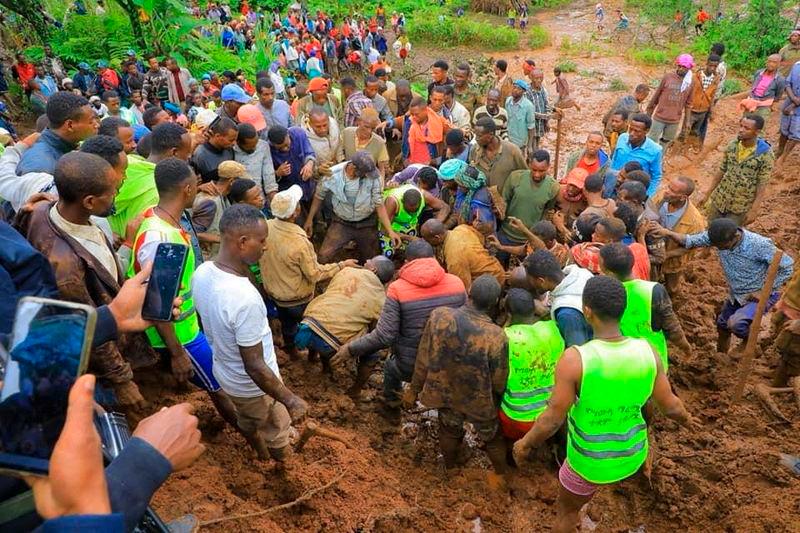ADDIS ABABA: Rescuers aided by drones were continuing a desperate search on Wednesday for possible survivors of devastating landslides in an isolated area of southern Ethiopia that have killed 229 people and affected thousands more.
Humanitarian agencies were also scrambling to rush emergency relief aid to the stricken community, the deadliest such incident recorded in Ethiopia, a country highly vulnerable to climate-related disasters.
About 14,000 people need to be evacuated from the area urgently because of the risk of further landslides, a UN source told AFP.
Local residents have been using shovels and their bare hands to dig through the vast mounds of mud to hunt for victims and survivors of the landslides in Kencho Shacha Gozdi, a hard-to-access locality in the regional state of South Ethiopia hundreds of kilometres from the capital Addis Ababa.
So far, 148 men and 81 women are confirmed to have died in the disaster, which struck the remote and mountainous area, the Gofa Zone Communications Affairs Department which covers the locality, said Tuesday.
Senait Solomon, head of communications for the South Ethiopia regional government, said eight people had been pulled from the mud alive and taken to medical facilities for treatment.
The number of people still missing is not known, but Senait said updated tolls might be issued later Wednesday.
“The search for survivors is ongoing and is currently being supported by drones operated by experts from the Information Network Security Administration (INSA),“ Firaol Bekele, early warning director at the Ethiopian Disaster Risk Management Commission (EDRMC) told AFP Wednesday.
“The government is addressing urgent needs for food, water, medicine and shelter,“ he said.
Officials have said that most of the victims were buried after they rushed to help other residents hit by a first landslide following heavy rains on Sunday.
The UN’s humanitarian response agency OCHA said more than 14,000 people had been affected in the area, which is roughly 450 kilometres (270 miles) from the capital Addis Ababa -- about a 10-hour drive.
The UN source told AFP that about 125 people had been displaced, and that the 14,000, including 5,000 pregnant or lactating women and 1,300 children needed to be evacuated fast because of the risk of another landslide.
Children and pregnant women affected
More than 21 million people or about 18 percent of the population rely on humanitarian aid in Ethiopia, the second most populous country in Africa, as a result of conflict and natural disasters such as flooding and drought.
“I am deeply saddened by this terrible loss,“ Ethiopian Prime Minister Abiy Ahmed had said on X on Tuesday in his first reaction to the calamity.
“Following the accident, the Federal Disaster Prevention Task Force has been deployed to the area and is working to reduce the impact of the disaster.”
World Health Organization chief Tedros Adhanom Ghebreyesus, who is Ethiopian, sent a message of condolence on X and said a WHO team was being deployed to support immediate health needs.
African Union Commission chief Moussa Faki Mahamat also posted a statement on X, saying “our hearts and prayers” were with the families of the victims.
The US embassy sent its condolences in a message on X and said the government via its USAID agency was in touch with humanitarian partners on the ground.
‘Landslide engulfed them’
The EDRMC official Firaol Bekele had told AFP on Tuesday that several residents had tried to save lives after four households were initially affected by a mudslide.
“But they too perished when the landslide engulfed them,“ he said.
He said there needed to be a “solid assessment and scientific investigation” into the cause of the landslide, which officials said was in an area prone to such disasters.
“An integrated, study-based solution is needed to address the risk permanently. This may include relocating the population.”
OCHA said Tuesday that a similar, but lower-scale landslide had occurred in May in the same area, killing more than 50 people.
Seasonal rains in South Ethiopia state between April and early May had caused flooding, mass displacement and damage to livelihoods and infrastructure, it had said in May.
In 2017, at least 113 people died when a mountain of garbage collapsed in a dump in the outskirts of Addis Ababa.
The deadliest landslide in Africa was in Sierra Leone’s capital in Freetown in August 2017, when 1,141 people perished.
Mudslides in the Mount Elgon region of eastern Uganda killed more than 350 people in February 2010.









